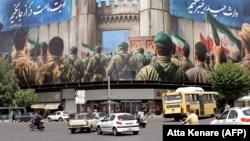The skies over Israel and Iran appeared calm as the second day of a cease-fire brokered by US President Donald Trump appeared to be holding after a shaky beginning.
Israeli authorities early on June 25 lifted most war-related restrictions on civilians, hours after a fuming US President Donald lashed out at both sides for violating the cease-fire he had announced late on June 23, calling for calm as what he labeled the “12-day war” appeared to come to an end.
The Israeli military's Home Front Command said the decision to ease restrictions was made after the latest security assessment.
The move will allow schools to restart in-room classes and will permit gatherings across most of the nation without limitations, although some of those related to the Gaza conflict will remain in place.
Iranian President Masud Pezeshkian, meanwhile, said his country was ready to return to a normal existence as the cease-fire took hold.
Pezeshkian, in a national TV address, said, "Starting today, the government and relevant institutions will begin reconstruction and restore normalcy."
He described Israel's actions as a "terrorist attack" that came at a time when Iran was seeking a diplomatic dialogue with the United States.
After rockets and air strikes launched by both sides caused severe damages and major casualties as the 7 a.m. start of the cease-fire approached on June 24 -- and after the deadline as well -- Trump reacted angrily toward the conflict participants.
Taking questions as he prepared to leave Washington for a NATO summit at The Hague, Trump hit out against ally Israel over reports it was again striking targets inside the territory of its archenemy despite an agreement to hold fire.
“They [the Iranians] violated it, but Israel violated it, too,” Trump said. He added,” I’m not happy with Israel."
Later, Israeli Defense Minister Israel Katz said he told US Secretary of Defense Pete Hegseth that his country would respect the cease-fire unless Iran violated it. Pezeshkian likewise said Iran would honor the cease-fire as long as Israel did, according to Iranian media.
The Trump announcement on the cease-fire came after Iran fired missiles at the Al Udeid Air Base in Qatar on June 23, causing no damage or injuries.
Trump said Tehran had given Washington prior notice of the attack -- a move many analysts said indicated Iran was not looking to escalate the crisis after US forces had struck multiple Iranian nuclear facilities on June 21.
Trump has said US forces "obliterated" Iran's nuclear sites, although questions remain about the magnitude of damage caused to the overall nuclear program, with US media citing intelligence sources as saying Iranian development had been set back only a few months. The White House denied the reports.
In a Truth Social posting late on June 24, Trump reiterated those remarks, saying, "The nuclear sites in Iran are completely destroyed!"
The chief of the Israeli military's general staff, Lieutenant General Eyal Zamir, on June 24 said that "we've set Iran's nuclear project back years, and the same applies to its missile program."
The conflict broke out after Israel on June 13 launched massive waves of air strikes against Iranian nuclear and military sites, killing many top commanders -- mainly from the hard-line Islamic Revolutionary Guard Corps -- and nuclear scientists.
Iran retaliated with barrages of missiles and drones targeting Israeli cities.
Israel, the United States, and other Western nations have been adamant that Iran will not be allowed to development nuclear weapons. Tehran says its nuclear program is strictly for civilian purposes.
Amid the cease-fire, the French ambassador to the United Nations said European nations were prepared to reactivate sanctions on Tehran if an agreement were not reached soon on its nuclear program.
Jerome Bonnnafont told a Security Council meeting that "we expect Iran to return to talks without delay in order to achieve a robust, verifiable, and lasting diplomatic solution."
Iran's Pezeshkian -- considered by many to be a relative moderate among the more hard-line rulers -- indicated his country was willing to resume nuclear talks.
Speaking by phone with Saudi Crown Prince Mohammed bin Salman, Pezeshkian said Iran's was ready to resolve differences with the United States "within the framework of international norms," according to the president's office.
Israeli Prime Minister Benjamin Netanyahu, in a nationally televised address, warned Iran that if attempted to rebuild its nuclear program, Israel would return to military action against the country.
He said Israel had achieved "a historic victory" and destroyed Iran's nuclear program over the 12 days but that it stood ready to "act with the same determination and the same force to cut off any such attempt [at restoration]."
Despite the cease-fire, tensions remained high in the Middle East.
The Israeli military on June 25 said six soldiers had been killed in Gaza, where its forces are still battling against fighters from the Iran-allied Hamas militant group, which has been declared a terrorist organization by the United States and UN. Further details were not immediately available.
And in Iran, the country's judiciary news agency Mizan reported that three men had been executed for allegedly "spying for Israel" in the northwestern Iranian city of Urmia.
"The sentence was carried out this morning...they were hanged," the judiciary said.
The Iranian government, which has long been accused of rights violation by activists and Western leaders, executed at least 975 people in 2024, up from 843 the previous year, according to a recent UN report.
Human Rights Watch, in a report last month, said that “Iranian authorities are carrying out a horrific execution spree, with at least 113 reported executions in the first 25 days of May 2025 alone.”
On May 28, Iran said it has executed Pedram Madani, who was accused of "spying for Israel" in a case human rights groups said was filled with "fundamental flaws" and based on confessions made under duress.














